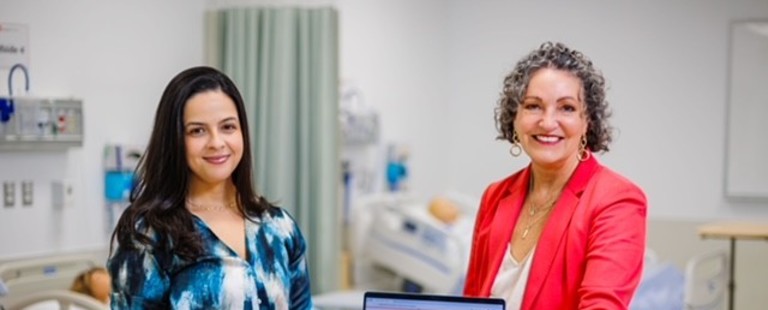Brock study explores AI support for breast cancer patients
After her own breast-cancer journey, AskEllyn founder and AC mentor Ellyn Winters-Robinson is helping lead a national study on how AI can support others through theirs.

On Tuesday, October 7th, 2025, Brock University announced a new national research project that will study how patients and caregivers affected by breast cancer can use AI-powered companions for support at scale. The two-year project is led by Amina Silva, Assistant Professor of Nursing at Brock University, and Ellyn Winters-Robinson, CEO of The Lyndall Project and AskEllyn, an AI companion developed with Waterloo-based Gambit Technologies.
The research project is the first of its kind that looks at how agentic AI can be used to provide non-medical support care for patients, their families, and other caregivers. In a press release for the project, Silva says that research into the trauma of a cancer diagnosis has historically been under-researched.
“Its impacts for patients and caregivers are not well understood. We also have a health-care system that is overburdened, underresourced and under strain, and a growing, diverse patient population for whom traditional support models may not be effective,” Silva says.
Building compassionate AI
Available 24 hours a day, seven days a week in virtually every language, AskEllyn provides support for patients, friends, and caregivers as they navigate a breast cancer diagnosis. Winters-Robinson says she is excited for the study to demonstrate that AI can deliver real value in healthcare to fill gaps in patient care journeys.
“The trauma that comes with any kind of diagnosis is underestimated, understudied and underserved in healthcare because we have medical systems that are resource constrained and just focused on treating the disease and not the whole patient,” Winters-Robinson says.
Winters-Robinson was diagnosed with breast cancer in 2022 and quickly experienced the gaps in care.
“Those first four weeks where I wasn't in treatment, I didn't know what to expect. I had panic attacks, my husband and I had bitter arguments because we were both scared. I described it to my brother as seeing an animal that had been hit by a car running in circles. There is no support. They tell you you've got cancer, and then they're just like, ‘Okay, go deal with it,’” Winters-Robinson says.
There are support programs and groups for patients and caregivers during treatment, but their availability will vary by geography and hospital. Many of those supports are also only available during treatment.
Winters-Robinson remembers the feeling of completing her last radiation treatment and banging the gong at the Waterloo Wellington Regional Cancer Program followed by breaking down in her car, overwhelmed by the emotional weight of her cancer treatment journey.
“There's so much trauma that I'm still trying to reconcile. But you don’t go through this alone. For every person that's been diagnosed and is going through treatment there are probably ten others friends, family, and children who are also very traumatized. This is going to be an important study around trauma and why there needs to be support,” Winters-Robinson says.
Research that puts people first
The research project, funded by the Canadian Cancer Society’s Disruptive Innovation Grant, will run for two years and recruit participants from across Canada, including marginalized groups such as trans and male breast-cancer patients.
For Winters-Robinson, the project is an opportunity to put data behind the stories she’s heard from AskEllyn users in over 100 countries and 50 languages. She believes the study will demonstrate how technology and empathy can come together to close critical gaps in patient and caregiver support.
The study comes at a critical time for AI-powered companions. The rise in ad-hoc usage of large language models (LLMs) for mental support has generated negative headlines for the industry. Winters-Robinson and the Gambit team knew that issues with source data and guardrails could derail their work, so they spent hundreds of hours developing a system that sources answers from a highly curated model.
She says Gambit’s Patrick Belliveau and Chris Silivestru knew people who were very vulnerable would be using the tool and were intentional about making sure AskEllyn would only provide non-medical advice.
“Is ChatGPT a good therapist? No, not necessarily. But I think layering a lived experience on top of it with a personality and the appropriate guardrails allows us to scale this needed support for cancer patients,” Winters-Robinson says.